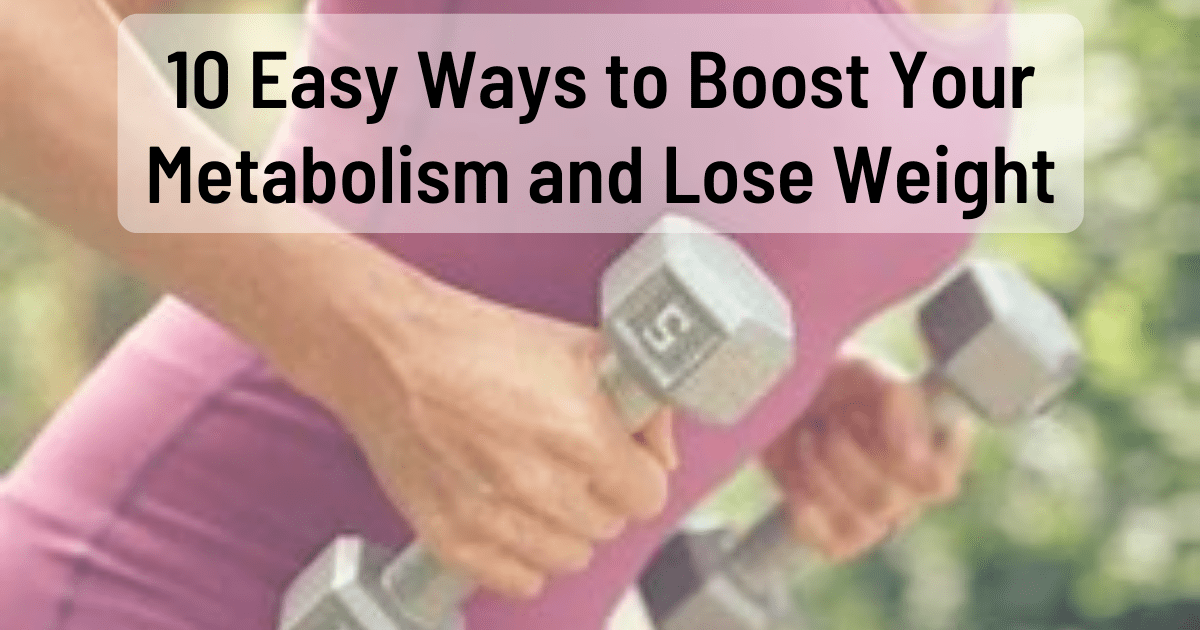10 Easy Ways to Boost Your Metabolism and Lose Weight
Weight loss can be a challenging process, especially when it comes to losing excess body fat. One of the essential factors that determine how fast or slow you lose weight is your metabolism. Metabolism refers to the body’s ability to burn calories and convert them into energy to sustain normal body functions. In other words, it is the rate at which your body burns calories.
The higher your metabolism, the faster your body burns calories, and the easier it is to lose weight. On the other hand, a slower metabolism means that your body burns calories at a slower rate, making it more challenging to lose weight. Therefore, if you are looking to lose weight, one of the best strategies to adopt is boosting your metabolism. Here are some tips on how to boost your metabolism to lose weight:
Build Lean Muscle
One of the most effective ways to boost your metabolism is by building lean muscle. Muscles are active tissues that require more energy to maintain than fat tissues. Therefore, the lean muscle you have, the higher your resting metabolic rate (RMR) will be. RMR refers to the number of calories your body burns at rest to sustain normal body functions such as breathing, circulating blood, and maintaining body temperature.
To build lean muscle, you need to engage in resistance training exercises such as weightlifting, bodyweight exercises, and resistance band exercises. These exercises stimulate muscle growth, which helps increase your RMR, thus boosting your metabolism. Moreover, building lean muscle also helps you burn more calories during and after your workouts, making it easier to create a calorie deficit necessary for weight loss.
Eat Enough Protein
Eating enough protein is essential when it comes to boosting your metabolism and losing weight. Protein is a macronutrient that requires more energy to digest and absorb than carbohydrates and fats. Therefore, consuming protein-rich foods helps increase your metabolic rate, as your body uses more energy to break down and absorb the protein.
Moreover, protein is also essential for building and maintaining lean muscle mass, which, as mentioned earlier, is crucial for boosting your metabolism. Therefore, make sure to include protein-rich foods such as lean meat, fish, poultry, beans, legumes, and dairy products in your diet.
Stay Hydrated
Staying hydrated is another essential factor when it comes to boosting your metabolism and losing weight. Dehydration can slow down your metabolism, as your body needs water to burn calories efficiently. Moreover, drinking water can help you feel fuller, thus reducing your calorie intake, which is essential for weight loss.
Therefore, aim to drink at least 8-10 glasses of water daily, or more if you are physically active or live in a hot climate. You can also include other low-calorie beverages such as herbal tea and infused water to increase your fluid intake.
Get Enough Sleep
Getting enough sleep is crucial when it comes to boosting your metabolism and losing weight. Lack of sleep can slow down your metabolism, as your body needs rest to repair and recover from daily activities. Moreover, sleep deprivation can increase your appetite and cravings for unhealthy foods, leading to overeating and weight gain.
Therefore, aim to get at least 7-8 hours of sleep daily, or more if you are physically active or have a busy lifestyle. Additionally, try to maintain a regular sleep schedule, avoid caffeine and alcohol close to bedtime, and create a comfortable sleep environment.
Eat Spicy Foods
Eating spicy foods can also help boost your metabolism and promote weight loss. Spicy foods contain capsaicin, a compound that helps increase your metabolic rate and reduce your appetite. Moreover, capsaicin also helps stimulate the release of endorphins, which are feel-good hormones that can help reduce stress and promote relaxation.
Bonus Tip: If you want to speed up your weight loss journey through a combination of diet and exercise, be sure to watch this entire video -> Click Here To Watch The Video
Incorporate High-Intensity Interval Training (HIIT)
High-Intensity Interval Training (HIIT) is a type of exercise that involves short bursts of high-intensity exercise followed by periods of rest. HIIT has been shown to be effective in boosting metabolism and promoting weight loss. This is because HIIT increases the production of growth hormone, which helps increase muscle mass and metabolism.
Moreover, HIIT also helps you burn more calories during and after your workout, making it easier to create a calorie deficit necessary for weight loss. You can incorporate HIIT into your exercise routine by performing exercises such as sprinting, cycling, or jump rope for 30 seconds followed by a 30-second rest period. Repeat this cycle for 10-20 minutes.
Avoid Crash Diets
Crash diets, also known as fad diets, are diets that promise rapid weight loss in a short period. These diets often involve severe calorie restriction, which can slow down your metabolism and lead to muscle loss. Moreover, crash diets can also be unsustainable, leading to weight regain once you go back to your regular eating habits.
Instead of crash dieting, focus on creating a sustainable calorie deficit by reducing your calorie intake slightly and increasing your physical activity levels. This will help you lose weight at a healthy and sustainable rate, without compromising your metabolism or overall health.
Manage Stress Levels
Managing stress levels is crucial when it comes to boosting your metabolism and promoting weight loss. Stress can increase the production of cortisol, a hormone that promotes fat storage and slows down metabolism. Moreover, stress can also increase your appetite and cravings for unhealthy foods, leading to overeating and weight gain.
Therefore, aim to manage your stress levels through techniques such as meditation, yoga, deep breathing, or other relaxation techniques. Additionally, try to incorporate stress-reducing activities such as spending time in nature, socializing with loved ones, or engaging in hobbies that bring you joy.
Eat Fiber-Rich Foods
Eating fiber-rich foods is another effective way to boost your metabolism and promote weight loss. Fiber is a type of carbohydrate that is not digested by the body, meaning it does not contribute to calorie intake. Instead, fiber passes through the digestive system relatively intact, promoting feelings of fullness and reducing calorie intake.
Moreover, fiber-rich foods also help regulate blood sugar levels, reducing the risk of insulin resistance, a condition that can slow down metabolism and lead to weight gain. Therefore, make sure to include fiber-rich foods such as fruits, vegetables, whole grains, beans, and legumes in your diet.
Stay Consistent
Finally, staying consistent is crucial when it comes to boosting your metabolism and promoting weight loss. While implementing the above tips can be effective in boosting your metabolism, consistency is key to achieving sustainable weight loss. Therefore, aim to make healthy habits a part of your daily routine and stick to them even when faced with challenges.
Conclusion
Boosting your metabolism is an essential factor when it comes to losing weight. By implementing the above tips, you can increase your metabolic rate, burn more calories, and promote weight loss. However, it is important to remember that sustainable weight loss requires a combination of healthy eating habits, regular physical activity, and consistent effort. Therefore, make sure to adopt a healthy lifestyle that works for you and stick to it in the long term.
Bonus Tip: If you want to speed up your weight loss journey through a combination of diet and exercise, be sure to watch this entire video -> Click Here To Watch The Video


